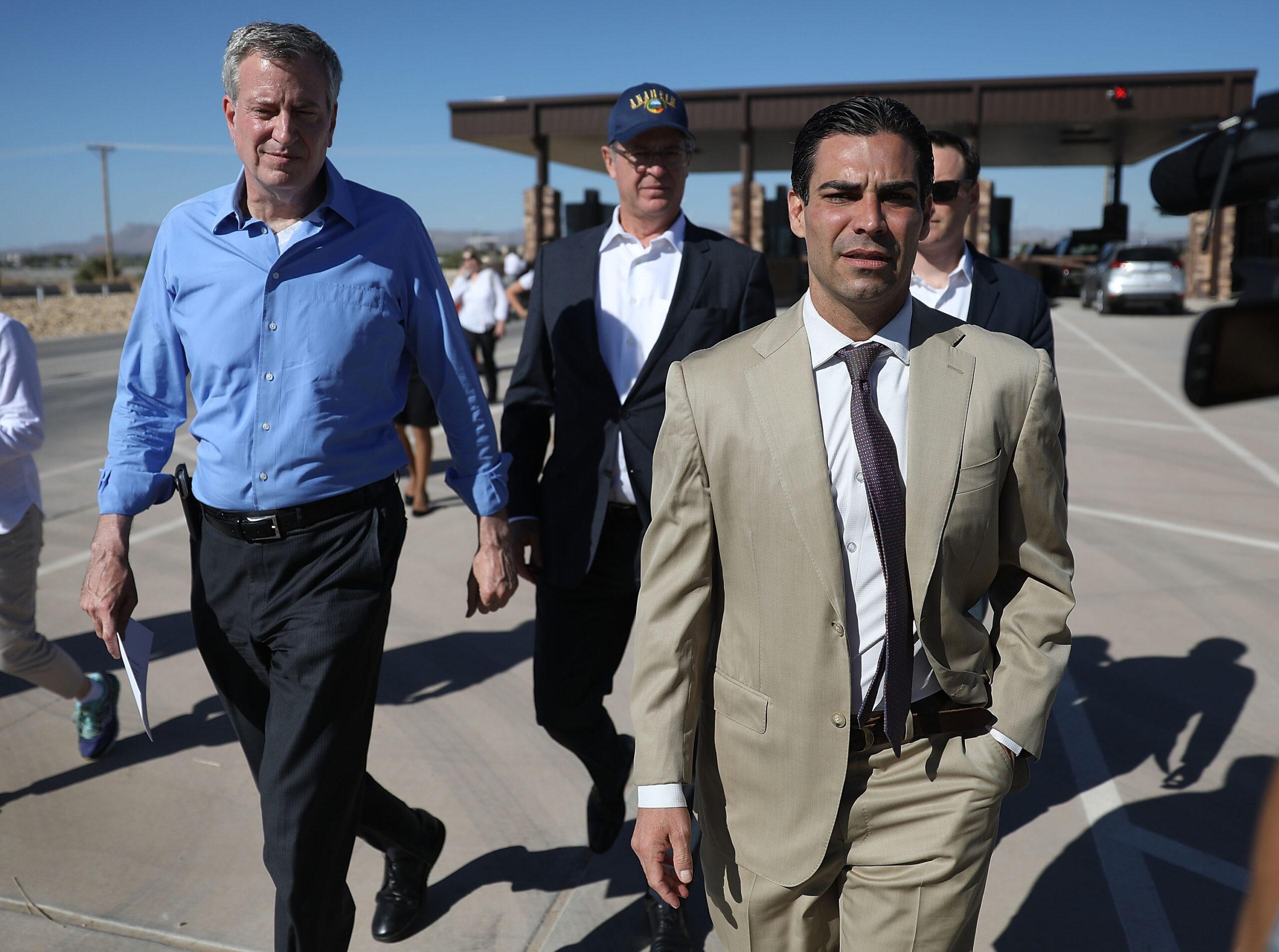Mayors Who Care About Child Separation Should Look in Their Own Backyards
Families are torn apart by the criminal justice system every day.

Last week, about 20 mayors from across America, including New York Mayor Bill de Blasio and Los Angeles Mayor Eric Garcetti, met in Tornillo, Texas, 35 miles south of El Paso and two miles from the Mexico border. The bipartisan group had traveled to the small town as a gesture of solidarity with the hundreds of children trapped in a government-run tent city there. The Trump administration had forcibly separated these children from their parents, and they were suffering alone, with no idea when they would see their parents again.
Even within spitting distance of the tent city, there was little the mayors could do. They tried to enter the camp, but were unsurprisingly denied access. Instead, they left pairs of children’s shoes on the sidewalk outside. The hope, although surely not the expectation, was that the shoes would be given to the children in detention. Then the mayors held a press conference. “They don’t know when they’re going to see their parents again,” de Blasio said. He and his peers surrounded the microphone, shiny from sweat in the 102-degree heat. “These kids have been traumatized. These kids are suffering physically and mentally.”
The U.S. Conference of Mayors official statement echoed the same sentiment, calling on the Trump administration to “immediately reverse these destructive policies and allow families apprehended to remain together to the extent possible, to help avoid the heartbreak and irreversible trauma of forced separation.”
It was a supportive gesture on the part of the mayors, an effort to bring more attention to the terror these children are being subjected to. The sound of children calling for their parents, unsure if they will ever see them again. The pictures of terrified, tired, and traumatized children. All of it is unbearable.
But it is not exactly unprecedented. As many have pointed out over the past few weeks, the separation of children, especially brown and Black children, from their parents has centuries of precedence in American history. During slavery, children were regularly taken from their parents arms the minute they could turn a profit. They were very often never reunited with their loved ones, even after slavery had been abolished. And America also ripped Native children away from their parents, sending them to “boarding schools” whose primary goal was assimilation.
And it continues. De Blasio’s statement in Texas was breathtakingly unaware. In cities across the country, including Los Angeles and New York, local elected officials are facilitating family separation every day.
In America there are 10 million children who, at some point in their lives, have had a parent incarcerated. Not all of these parents have actually been convicted of a crime. Many of them spent days or weeks or months in jail just because they couldn’t afford to pay bail. Like the parents apprehended at the border, many of those jailed or imprisoned in the U.S. are simply accused of a misdemeanor. And, again, children of color are more likely to suffer: One in nine Black children has a parent in prison or jail, compared to one in 28 Hispanic children, and one in 57 white children.
Much of this parental incarceration happens in the very cities these mayors represent. In New York, about 17,500 people are arrested each year for marijuana possession, and 86 percent of them are people of color. Meanwhile, in 2016, almost 4,000 people at Rikers Island at any given time were in jail because they couldn’t afford bail. Los Angeles County has the biggest jail in America, housing an average of 19,000 people at any given time. But just last week the county approved the construction of another $2.2 billion facility. Meanwhile, Garcetti has pushed for one million more hours of policing over two years.
There are some major differences between what’s happening at the border and what happens in our jails and prisons every day. Of course, when parents are arrested we don’t round up their children en masse and throw them all in one facility. There’s no massive tent city solely for the purpose of housing children whose parents have been locked up.
But children with incarcerated parents often suffer harmful and disruptive consequences that have long-lasting impact. This is especially true of those with incarcerated mothers. Those harms are only expanding: The incarceration rate for women has exploded 700% since 1980, and 80 percent of incarcerated women are mothers. Studies have shown that 90 percent of children with incarcerated fathers live with their mothers. But only 25 percent of children with incarcerated mothers live with their fathers. Having an incarcerated father means a child is significantly more likely to be homeless. Having an incarcerated mother means they are more likely to be in foster care.
Most mayors, of course, can’t directly enact criminal justice policy. That is often done on the county level. (New York’s structure gives de Blasio more power than most mayors to impact the criminal justice system.) But these mayors also can’t impact federal immigration policy. Yet, they are speaking out against how our government is treating families simply because these parents are accused of committing a minor offense. If they feel compelled to speak out at the border, why are they not compelled to speak out at home?
The idea of separating a parent from their child over a mere misdemeanor offense—whether marijuana possession or illegally crossing a border—is reminiscent of authoritarian regimes, not a free democracy. And yet, it happens every day. Perhaps next, de Blasio can go to Rikers Island and ask about the children of those inmates. What he despises in Texas, he encourages in New York.
Mayors all have the ability to speak out about the policies that exist in their jurisdiction, and call for reform. They know how many children are parentless in Torillo. But what about their own hometowns?
